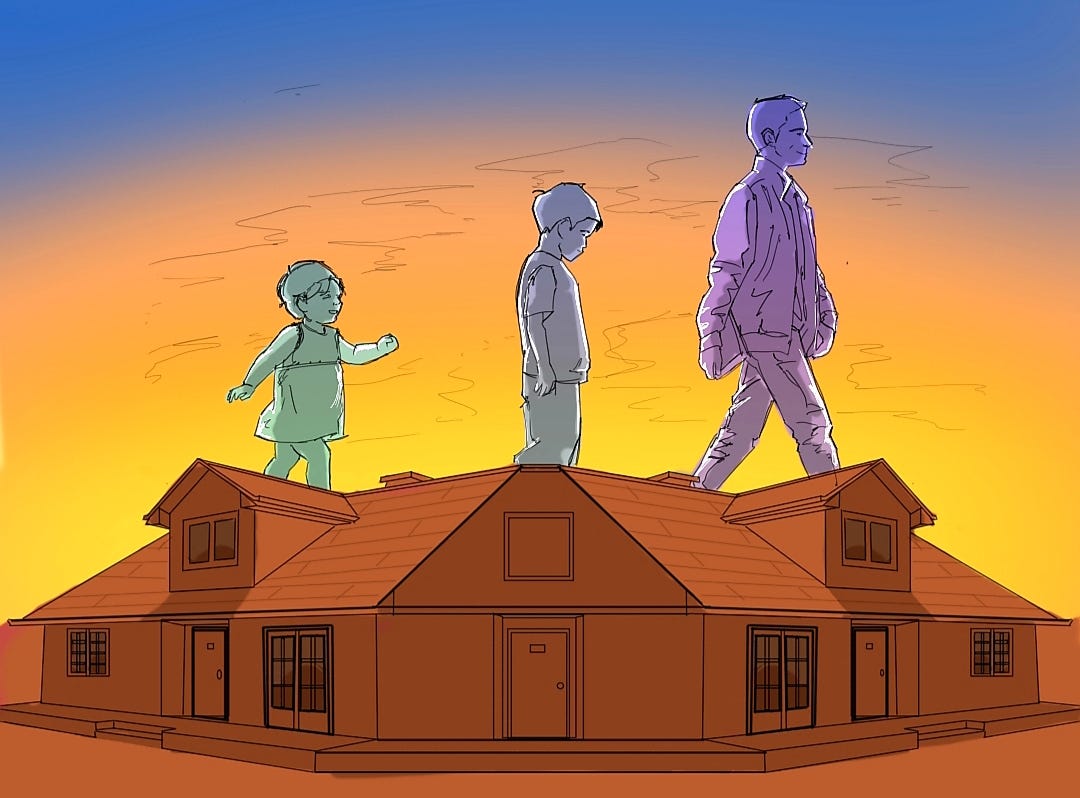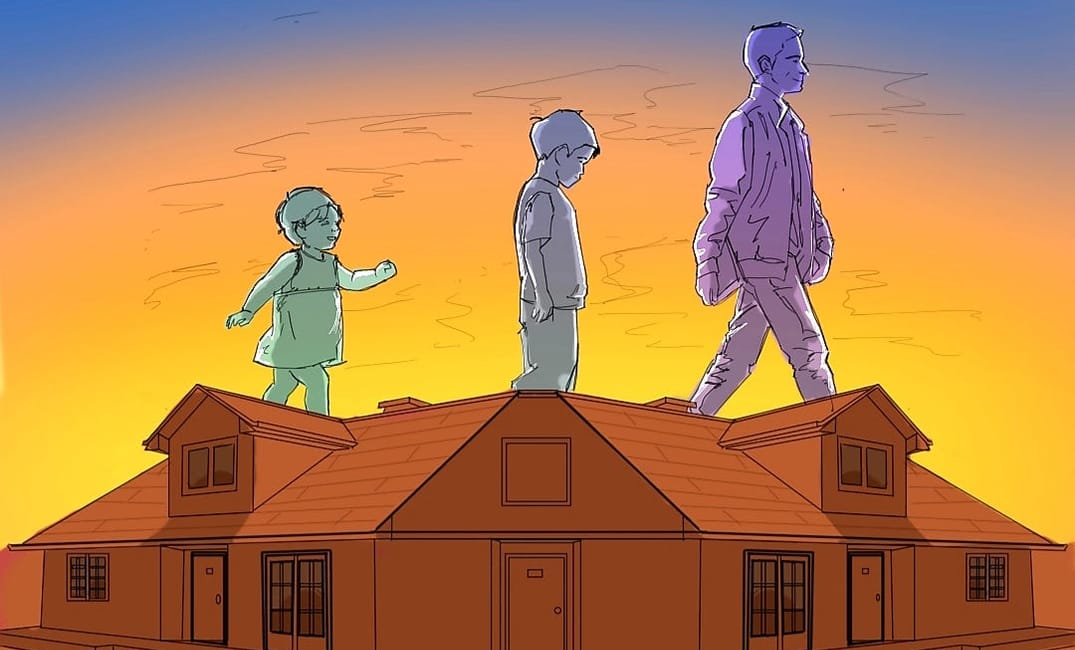
“The boys are peeing in the yard again,” I say to my neighbor one spring morning. It’s 2006, just a few years into our community-living experiment in the East Bay, and the yard is one we share. She’s got four kids, and her youngest is in between my two: the dynamic-trio ages of four, five and six.
Apparently, they think it’s funny to find special spots around the property at which to let loose. Not the worst problem, but probably one worth addressing.
“Do we care?” she asks.
It’s a great question.
“Well, in terms of the ongoing young-children-socialization project, we should probably talk to them about it, don’t you think?” I asked.
We come up with a party line, gather the boys and lay down the law. No peeing in the yard. I’m not sure if our little chat is effective, but at least my neighbor and I present a united parental front.
The boys are now 17, 18 and 19, and they’ve grown up in this unusual environment called cohousing. We’re a group of nine households — singles, couples and families — in Oakland’s Temescal Commons cohousing development, which came together in 1997 with the idea that we would build a community and therefore share our lives in meaningful ways. That means tangible resources, like cars, tools and laundry machines, as well as work, like property maintenance. But it also means our spiritual paths, health challenges, careers and extended families and, of course, the rearing of our children.
In our 20s, my husband and I thought cohousing would be a great way to live our ideals about real commitment to a wider neighborhood, a lighter impact on the earth and partnership from our cohousing partners on our life paths.
We all have fully functional homes, but we also have a shared common house with a kitchen, and part of our community life includes two meals a week together and monthly workdays. And although my neighbors and I are still in the minority when it comes to choosing this lifestyle, we do have company: There are 165 communities like ours in the US (at least 14 in the East Bay alone) and 140 forming, according to the Cohousing Association. People may pursue cohousing because they want to avoid the increasing isolation that’s common in American culture, to live more sustainably or, like us, to raise their children with the support of other adults.
When we moved into our homes in the spring of 2000, there were seven kids among us, ranging from my newborn son to 11-year-old twins; to that pack we added another two babies and two teenagers who came to live with their parents for brief periods of time. Now we’ve got a new cohort developing: three girls, ages five, two and eight months.
In our 20s, my husband and I thought cohousing would be a great way to live our ideals about real commitment to a wider neighborhood, a lighter impact on the earth and partnership from our cohousing partners on our life paths. I wanted to be able to watch and learn from my neighbors as they parented their older kids, to talk through knotty decisions and to get support when things got rough.
I’m an introvert, and the stress of trying to figure out care for and the feeding of a newborn was blowing all my social-energy circuits.
It sounded great on paper, but once we were all settled — and I was trying to learn how to be part of the community in a way that felt healthy to me, not to mention how to take care of a baby — things got tricky.
I’m an introvert, and the stress of trying to figure out care for and the feeding of a newborn was blowing all my social-energy circuits. My neighbor with the four children is an extrovert and spent her days in and out of her house, her front door open; often her kids milled around, doing their own thing, and sometimes I found myself supervising them more than I wanted to just because I was also outside with my kid. At the time, I didn’t know how to talk to her about it, so instead I let myself sink deeper into resentment.
The truth is that I’m raising my kids in cohousing in part because it challenges me to become a better advocate for myself and for them — to speak up calmly but with conviction when something bothers me.
I’m ashamed that in our beginning years—hell, probably last week too — I judged my cohousing comrades when they were experiencing something with their kids that I was not. In those early days, I hadn’t yet learned that if it’s not your kid today, it will be soon. (I take comfort in the sure knowledge that my cohousing parent comrades have judged me too.) We’ve lived our parenting conflicts in public, so to speak, in a way that perhaps a typical suburban family does not. And the thing is, you have to work through it because common meal is tonight, and sure, you can skip it, but you’re going to see that neighbor tomorrow, so you might as well deal with it now.
The truth is that I’m raising my kids in cohousing in part because it challenges me to become a better advocate for myself and for them — to speak up calmly but with conviction when something bothers me. And even though there have been intensely uncomfortable moments over these past years when parenting styles clashed, I would not trade for anything the opportunities I’ve had to observe my neighbors raising their children, because it’s given me a bigger array of tools for my own parenting than I would have had if I had just used the set I got from my family of origin.
I’ve witnessed my beloved neighbors cope with a child’s debilitating depression, a persistent marijuana habit, toxic friends, faltering sibling relationships, totaled cars and stolen bikes. I’ve talked through how to handle high school parties (yes, my child, you do need to check if there will be an adult there, and by the way, what’s the parent’s name so I can give her a call?) and how to best discuss drug use (don’t do it, but if you do, you can always call for a ride home). And constantly there has been the at-times contentious urban-school conversation: how to get our kids what they need while balancing spiritual, financial and social-justice metrics — factors that each family weighs differently.
But however challenging it has been at times to live in close community with other families, the benefits to my boys have been legion. Because they’ve grown up around a passel of kids and adults in a more intentional way than they might have in the setting of a neighborhood of single-family homes, they’ve gotten lots of chances to practice resolving conflict, learned from a variety of “aunties” and “uncles” things that my husband and I don’t know how to do — like beekeeping and golf and tennis and sculpting — and practiced being of service by helping with common meals or monthly workdays.
As far as I know, no one pees in the yard anymore. But the parenting experiment continues as we watch our children try to find their way as young adults, going to college — or not — experiencing committed loving relationships — or not — and figuring out how to make a living. And despite our diverse parenting styles, what remains for me after all these years is a fierce respect for my fellow cohousing parents. If it really does take a village to raise a child, I wouldn’t have it any other way.







